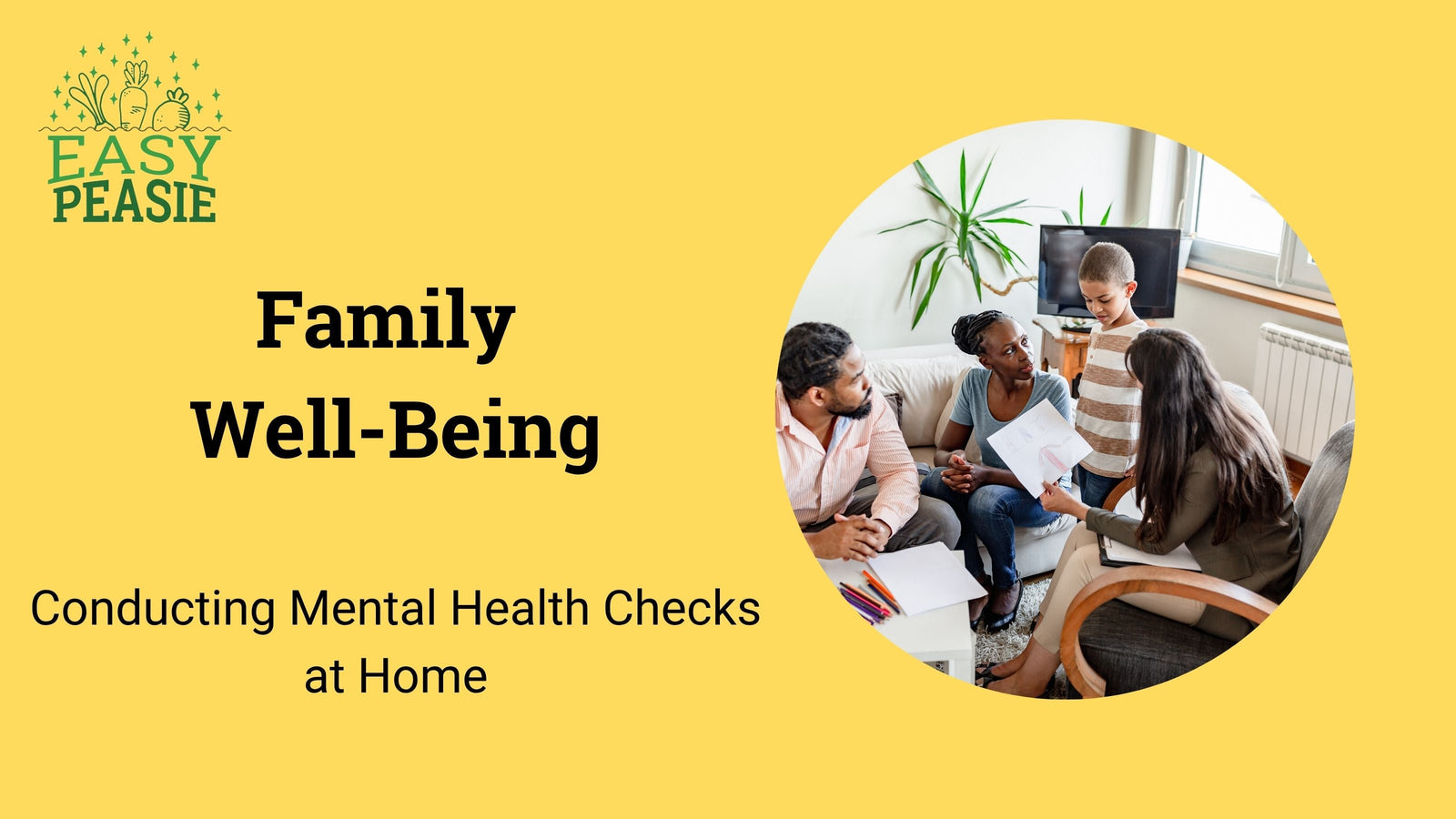The Heart of Home Health—Mental Well-being
The Importance of Mental Health Monitoring in the Family
In every family, mental health plays a pivotal role in ensuring a harmonious and nurturing home environment. Monitoring the mental well-being of each family member is crucial not only for maintaining individual health but also for preserving the overall vitality of the family unit.
By staying attuned to the mental health of our loved ones, we can support each other through challenges and foster a more empathetic and understanding family dynamic.
How Mental Health Influences Family Dynamics
Mental health deeply influences how we interact within our family. Positive mental health fosters stronger bonds, better communication, and more effective conflict resolution.
Conversely, when a family member struggles with mental health issues, it can ripple across the entire family, affecting everything from daily interactions to long-term relationships. Understanding this impact is key to addressing mental health proactively and with compassion, ensuring that the family not only survives but thrives together.
Understanding Mental Health at Home
The Basics of Mental Health
Mental health is as crucial as physical health and involves emotional, psychological, and social well-being. In a family setting, it determines how we think, feel, and behave daily. It also influences how we handle stress, relate to others, and make choices.
For families, nurturing mental health means creating an environment where each member can develop resilience, feel safe to express emotions, and seek support when needed.
Role of Family in Mental Health
The family environment plays a foundational role in shaping mental health. Positive interactions within the family can bolster self-esteem, foster resilience, and support emotional well-being, whereas negative interactions can contribute to stress and mental health struggles.
Families that prioritize open communication, respect, and understanding create a supportive network that reinforces the mental health of all members, helping them to face external challenges more effectively.
Conducting Mental Health Checks
How to Check In On Someone’s Mental Health
Initiating a conversation about mental health should be approached with compassion and openness, similar to addressing a physical health issue. Gentle, non-judgmental questions like "How have you been feeling lately?" or "What’s been on your mind these days?" can open the door for your loved ones to share their feelings and experiences.
Encouraging regular, informal check-ins can normalize these conversations, making it clear that mental health is a priority and it’s perfectly acceptable to discuss it openly within the family. This ongoing dialogue helps to build a supportive environment where family members feel valued and understood.
Expanding the Conversation
In addition to open-ended questions, it can be helpful to share your own experiences with mental health to create a more reciprocal dialogue. This can help to de-stigmatize mental health issues and show that it’s safe to share personal feelings and challenges.
Encouraging family members to express not just their troubles but also their joys and achievements can foster a more comprehensive understanding of their overall well-being.
Self Mental Health Checks
Regular self-assessment is a crucial component of maintaining mental health. Individuals should take time to reflect on their emotional state by asking introspective questions like, "Have there been changes in my mood or mindset?" or "Am I finding it difficult to cope with situations that I usually manage well?"
Keeping a journal or using simple mental health apps to track these reflections can be instrumental in identifying emotional patterns or triggers.
Practical Tools for Self-Assessment
Encourage the use of tools such as mood trackers or mental health apps that offer guided reflections and can help in recognizing the early signs of stress or depression.
These tools can provide valuable insights that might not be apparent through casual reflection alone. Understanding these signs can lead to proactive measures, whether it’s seeking professional help, adjusting daily routines, or employing stress reduction techniques. This proactive approach to mental health can significantly impact overall well-being, allowing individuals to manage their mental health with the same diligence as their physical health.
Tools and Techniques for Mental Health Assessment
Using Mental Health Assessment Tools
Incorporating mental health assessment tools can be a proactive step in understanding and managing your family’s emotional well-being. There are numerous online resources and apps that provide questionnaires designed to gauge mental health status.
These tools often offer immediate feedback and can be a starting point for discussions with healthcare professionals. However, they should complement, not replace, professional advice.
Recognizing Signs of Mental Health Issues
Being aware of the signs that suggest a mental health check might be necessary can help in taking timely action.
Some key indicators include significant changes in mood or behavior, withdrawal from social interactions, unexplained irritability, or a decline in performance at school or work. Physical symptoms, such as changes in sleep patterns or unexplained aches, can also be signs of mental distress. Recognizing these signs early can lead to more effective interventions.
Addressing Mental Health Issues
When and How to Seek Help
Recognizing when to seek professional help is crucial in effectively addressing mental health issues.
If family interventions and self-checks do not seem to improve the situation, or if the symptoms escalate and start to interfere significantly with daily life, it's time to consult a professional. Start with your family doctor who can provide an initial assessment and referrals to mental health specialists if necessary. Remember, seeking help is a sign of strength, not a weakness.
Support for Parents of Children with Mental Illness
Supporting a child with mental health issues can be challenging, but parents don't have to do it alone. There are many resources available, including support groups, counseling services, and online forums dedicated to parenting children with mental health conditions. Check out a few of these resources at the end of this blog.
These resources can provide not only practical advice but also emotional support from others who understand the challenges you are facing. Engaging with these communities can empower parents with the knowledge and support needed to provide the best care for their children.
Impact of Parental Mental Health on Children
Understanding the Influence
Parents' mental health significantly impacts the emotional and psychological development of their children. Children are keen observers and often pick up on the emotional cues of their parents, which can influence their own feelings of security and emotional well-being.
A parent struggling with mental health issues may have difficulty providing consistent care and emotional support, which can lead to anxiety or behavioral issues in children. Recognizing this influence is crucial for fostering a healthy family environment.
Strategies for Parents to Maintain Healthy Mental Well-being
It is essential for parents to prioritize their mental health not just for their own well-being, but also for their children's. Engaging in regular physical activity, maintaining social connections, and practicing mindfulness or relaxation techniques are all effective strategies.
Seeking timely professional help for mental health issues is also vital. By modeling these healthy habits, parents can not only improve their own mental health but also set a positive example for their children to follow.
Summary: Embracing Mental Health as a Family Priority
Recap of Key Insights
Throughout this article, we've explored the vital role of mental health monitoring within the family, from understanding basic mental health care to employing practical assessment tools and addressing specific issues.
We've emphasized the importance of recognizing signs of mental distress early and the profound impact parental mental health has on children.
Encouragement for Continued Vigilance and Dialogue
Maintaining mental well-being in the family requires ongoing education and an open line of communication. Let's continue to learn about mental health together and keep the conversation going at home. Encourage family members to express their feelings and share their struggles. Remember, addressing mental health is not a one-time task but a continuous journey of care, understanding, and support. By fostering an environment where mental health is openly discussed and valued, we can ensure a healthier, happier future for all family members.
Join the Movement Towards Healthier Minds
Implement and Share Your Journey
We invite you to make mental health checks a regular part of your family routine. Just like a healthy diet or exercise, mental wellness is crucial for your family's overall well-being.
Start today, and don't hesitate to share your progress, challenges, and successes along the way. Your story could inspire others to take that first crucial step towards better mental health.
Leave your comments below; we love to hear from you! And don't forget to follow Easy Peasie for more veggie info and convo on YouTube, Facebook, and Instagram! ~ThePeas
Resources for Support and Growth
Remember, you're not alone on this journey. Below are mental health resources and supportive communities where you can seek advice, share experiences, and connect with others who understand the challenges you're facing:
- National Alliance on Mental Illness (NAMI)
- Mental Health America (MHA)





